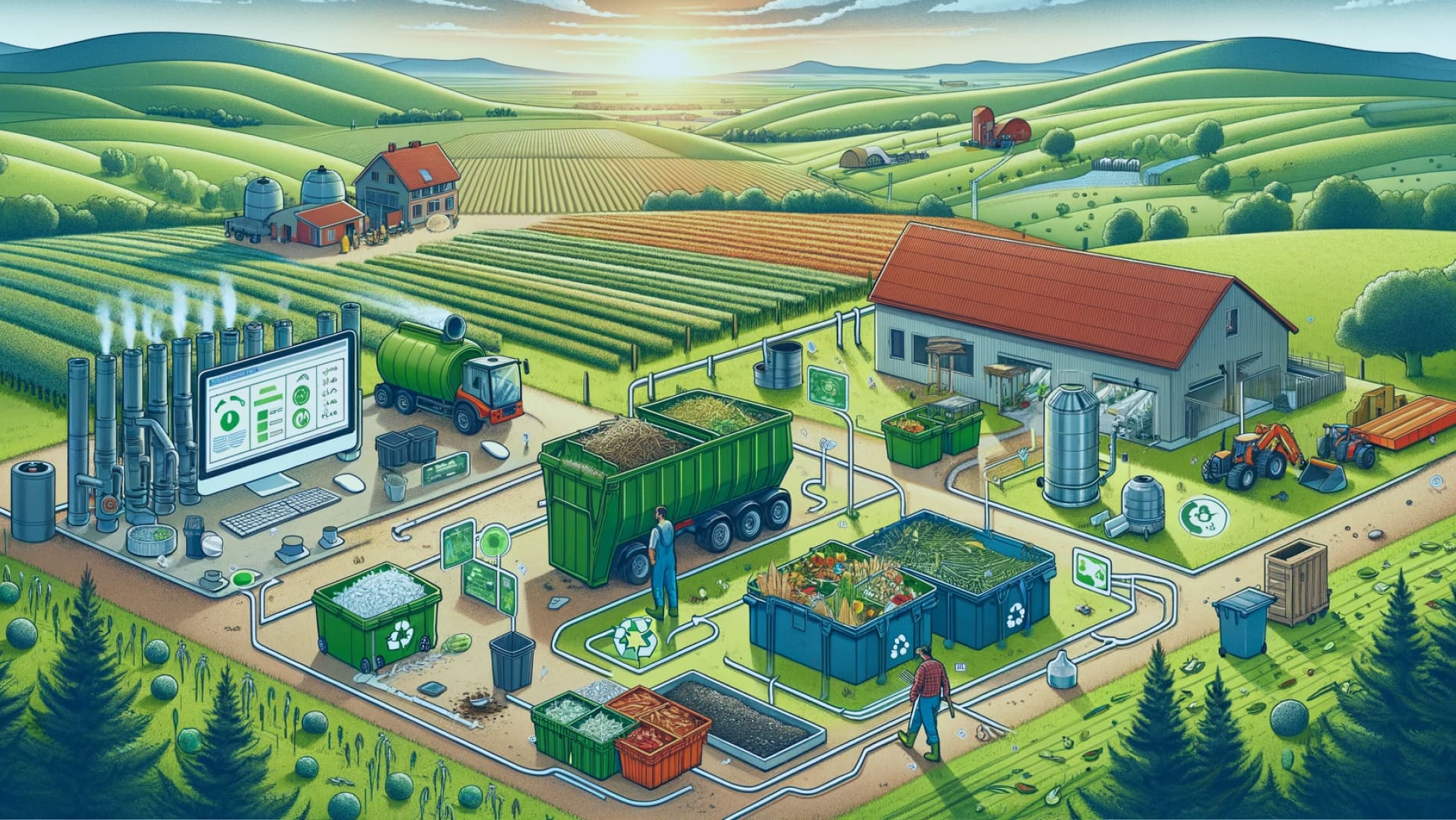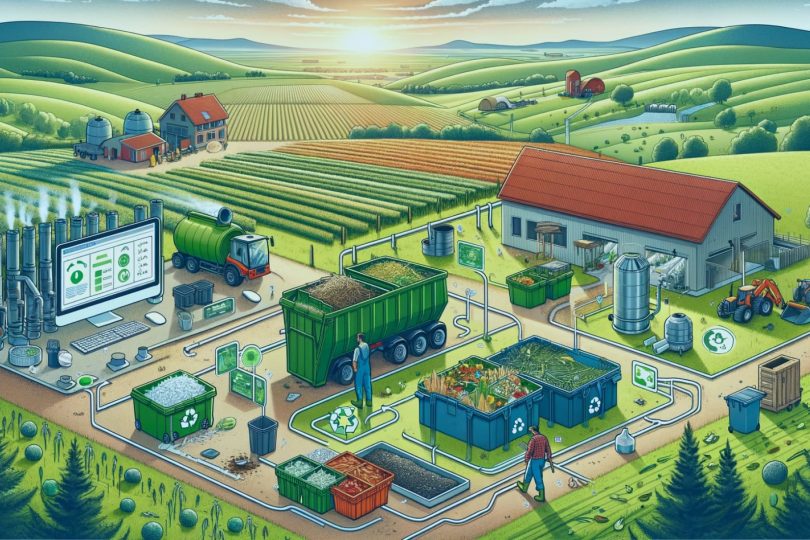
In the world of agriculture, the term “waste management” might not be the first thing that comes to mind. However, efficient waste management plays a crucial role in ensuring the sustainability and profitability of agricultural businesses. In this blog, we will explore the ins and outs of waste management for agriculture. We will discuss why waste management matters, the types of agricultural waste, and practical solutions to streamline waste management processes.
Why Does Waste Management Matter in Agriculture?
Waste management is a crucial aspect of modern agriculture, and understanding its significance is the first step towards implementing effective practices. Here are some in-depth reasons why waste management matters in agriculture:
Environmental Responsibility:
Agriculture, while essential for feeding the world’s growing population, has a substantial environmental footprint. It can lead to soil erosion, water contamination, and habitat destruction. Proper waste management practices help mitigate these negative impacts.
-
- Soil Preservation: Crop residues and organic waste, when not managed correctly, can lead to soil degradation. This can result in reduced crop yields, increased erosion, and the loss of valuable topsoil. By implementing waste management practices like composting and mulching, agricultural businesses can protect their soil’s health and long-term productivity.
- Water Quality: The runoff from improperly managed agricultural waste can carry harmful chemicals, nutrients, and pathogens into nearby water bodies. This can cause water pollution and harm aquatic ecosystems. Efficient waste management reduces the risk of contaminating water sources, promoting clean and safe water.
- Biodiversity Conservation: Habitat destruction due to poor waste management can disrupt local ecosystems and harm wildlife. Implementing responsible waste management practices can help preserve biodiversity and maintain the balance of local ecosystems.
Regulatory Compliance:
Agricultural waste is subject to various regulations and guidelines imposed by local, state, and federal authorities. Non-compliance with these regulations can result in fines, legal issues, and damage to your business’s reputation. It’s essential to stay informed about and adhere to these regulations to avoid legal repercussions.
-
- Waste Disposal Regulations: Laws often dictate how different types of agricultural waste should be handled, stored, and disposed of. Understanding these regulations and ensuring compliance is critical.
- Reporting Requirements: Some regulations may require agricultural businesses to report their waste management activities regularly. Keeping accurate records and submitting required reports on time is vital for maintaining compliance.
- Environmental Impact Assessments: In some cases, agricultural projects may require environmental impact assessments to evaluate the potential effects on the surrounding environment. Adequate waste management planning can be a crucial component of these assessments.
Cost Reduction:
Efficient waste management practices can lead to significant cost savings for agricultural businesses. By minimizing waste and maximizing the use of resources, you can optimize your operations and reduce expenses.
-
- Waste Disposal Costs: Proper waste management can reduce the volume of waste that needs to be sent to landfills or incinerators. This, in turn, lowers waste disposal costs, which can be a substantial expense for some agricultural operations.
- Fertilizer Savings: Through composting and recycling organic waste, you can produce nutrient-rich compost that can replace or supplement commercial fertilizers. This reduces the need for costly chemical fertilizers, saving your business money in the long run.
- Resource Efficiency: Waste management is not just about waste reduction; it’s about resource optimization. Efficiently managed waste can become a valuable resource, benefiting your agricultural operations in multiple ways.
Resource Optimization:
Agricultural waste often contains valuable nutrients and organic matter that can be reused to benefit your farming operations.
-
- Compost Production: Crop residues, food processing waste, and animal manure can be composted to create nutrient-rich organic matter. Compost improves soil structure, enhances moisture retention, and fosters beneficial soil microorganisms, ultimately leading to healthier and more productive crops.
- Nutrient Recycling: By recycling nutrients from waste materials, you can reduce the need for external inputs like synthetic fertilizers. This not only saves money but also reduces the environmental impact associated with fertilizer production and application.
- Energy Production: Certain agricultural waste, such as crop residues and animal manure, can be converted into biomass energy through processes like anaerobic digestion or gasification. This provides a renewable energy source while reducing waste volume.
Types of Agricultural Waste
Crop Residues:
-
- Stalks: After harvesting crops like maize, wheat, or sugarcane, the remaining stalks can be considered crop residues. These can be quite substantial and, if not managed properly, can accumulate as waste.
- Leaves and Roots: Leaves and roots left behind in the field after harvesting vegetables or leafy crops are also considered crop residues.
- Management Options: Utilize crop residues in various ways. You can plow them back into the soil to enhance organic matter content, reduce erosion, and improve soil structure. Alternatively, you can collect and use them for animal bedding, mulching, or composting.
Animal Manure:
-
- Livestock Waste: Manure from cows, pigs, poultry, and other livestock is a significant component of agricultural waste.
- Environmental Concerns: Improper management of animal manure can lead to nutrient runoff, which can pollute water sources and harm aquatic ecosystems. It can also emit greenhouse gases like methane and ammonia if not handled correctly.
- Management Options: Animal manure can be composted, used as fertilizer directly, or processed through anaerobic digestion to produce biogas and nutrient-rich digestate. Properly managed, it becomes a valuable resource for soil enrichment.
Packaging Waste:
Agricultural products often come in various packaging materials, including plastic bags, containers, and crates. These packaging materials can contribute to waste generation on farms.
-
- Recycling: To reduce the environmental impact of packaging waste, agricultural businesses can implement recycling programs. Plastic packaging, for instance, can be recycled to create new products, reducing the need for raw materials.
Pesticide Containers:
Empty pesticide containers can pose a risk if not properly disposed of. They may contain residue of harmful chemicals that can be detrimental to the environment and human health.
-
- Recycling Programs: Many regions have established recycling programs for pesticide containers. These programs clean and recycle the containers, ensuring they do not become waste.
Agrochemical Waste:
Agricultural operations use various agrochemicals such as pesticides, herbicides, and fungicides. Containers, leftover chemicals, and contaminated materials can become hazardous waste if not managed correctly.
-
- Hazardous Waste Management: Agrochemical waste should be handled and disposed of following strict regulations. Hazardous waste collection and disposal services can ensure compliance.
Food Processing Waste:
Food processing facilities that handle agricultural products generate waste in the form of peels, scraps, and other byproducts.
-
- Potential Uses: Utilize food processing waste for animal feed, composting, or as raw materials for other food products to reduce waste and add value to the waste stream.
Greenhouse Waste:
Greenhouses used for growing plants can generate waste in the form of discarded plants, pots, and materials.
-
- Recycling and Reuse: Many greenhouse materials can be recycled, and pots and trays can be sanitized and reused. Proper management of greenhouse waste helps reduce waste generation.
Practical Solutions for Agricultural Waste Management with Software Integration
Now that we’ve discussed the significance of waste management in agriculture and the types of agricultural waste, let’s explore practical solutions that leverage modern technology, including agriculture waste management collection software, to streamline the process.
Composting with Software Integration:
-
- Utilizing agriculture waste management collection software can help farmers track and manage the composting process effectively. The software can provide real-time data on compost piles’ temperature, moisture levels, and turning schedules, ensuring optimal conditions for decomposition.
- The software can also assist in monitoring the carbon-to-nitrogen ratio, helping farmers adjust inputs for a balanced compost mix.
Recycling with Software Assistance:
-
- Agriculture waste management collection software can help businesses track and manage recyclable materials within their waste streams more efficiently. Maintain a digital inventory of recyclables through it, ensuring proper sorting and sending of these materials for recycling.
- The software can also generate reports on recycling rates, helping agricultural businesses measure their environmental impact and compliance with sustainability goals.
Biomass Energy Production Supported by Software:
-
- For those considering biomass energy production from agricultural waste, agriculture waste management collection software can aid in tracking the collection and processing of biomass materials.
- It can provide data on the volume and type of waste materials suitable for biomass conversion, helping businesses plan and optimize their energy production operations.
Anaerobic Digestion with Software Integration:
-
- When implementing anaerobic digestion for organic waste, software can play a vital role in monitoring and controlling the process.
- Agriculture waste management collection software can provide data on digester temperatures, gas production rates, and nutrient content in the digestate. This real-time information ensures that the anaerobic digestion system operates efficiently.
Mobile Apps for Waste Reporting:
-
- Integrate agriculture waste management collection software into mobile apps for farm managers and workers. These apps allow users to report waste incidents, track waste quantities, and access waste management guidelines from the field.
- Mobile apps enable real-time communication and reporting, making waste management more responsive and transparent.
Data Analytics for Informed Decision-Making:
-
- Agriculture waste management collection software collects and stores a vast amount of data on waste generation, disposal, and recycling. Analyze this data to make informed decisions about waste management processes.
- Data analytics can help businesses identify patterns, optimize waste collection schedules, and minimize costs.
Automated Sorting Systems with Software Control:
-
- In recycling centers or waste processing facilities, automated sorting systems can efficiently separate recyclables from mixed waste. Agriculture waste management collection software can control and monitor these systems.
- The software can adjust sorting parameters, track the quality of recyclables, and ensure that the sorting process is efficient and accurate.
The Role of Technology in Agricultural Waste Management
In today’s digital age, technology can be a valuable ally in agricultural waste management for B2B operations. Here are some technological advancements that can make a difference:
IoT Sensors:
Install sensors on agricultural machinery and storage facilities to monitor waste levels, temperature, and humidity. This data can help optimize waste management processes.
GPS Tracking:
Utilize GPS technology to track agricultural waste movement, ensuring appropriate disposal or recycling.
Data Analytics:
Analyze data collected from sensors to make informed decisions about waste management, such as when to schedule composting or recycling pickups.
Mobile Apps:
Develop mobile apps for farm managers and workers to report waste incidents, track waste quantities, and access waste management guidelines.
Automated Sorting Systems:
Invest in automated sorting systems for recycling centers to efficiently separate recyclables from mixed waste.
Conclusion
In the world of agriculture, waste management is not just an afterthought; it’s a strategic necessity. B2B agricultural businesses must recognize the importance of efficient waste management to reduce costs, ensure compliance, and contribute to environmental sustainability. By implementing the practical solutions and leveraging technology, agricultural businesses can streamline their waste management processes, ultimately benefiting their bottom line and the planet.
Remember, waste management is a continuous journey of improvement. Stay informed about the latest advancements in waste management technologies and best practices to keep your agricultural business ahead of the curve in this essential aspect of sustainability and profitability.





